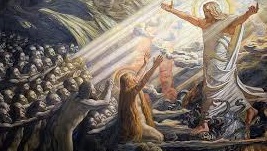
Resurrection of the Dead
The teaching of the resurrection of the dead had a relatively late origin in Judaism; in the Old Testament, it appears in the Book of Daniel, which was written around 167–164 B.C.: Many of those who sleep in the dust of the earth shall awake; some to everlasting life, others to reproach and everlasting disgrace (Daniel 12:2). In the New Testament, the Sadducees denied the resurrection of the dead; in the Gospels of Mark, Matthew and Luke, they tested Jesus with a hypothetical case about seven brothers who died one after the other, and according to a law on Levirate Marriage, had taken the same woman in marriage (cf. Mark 12:18-27, Matthew 22:23-33, Luke 20:27-40). They asked Jesus: At the resurrection of the dead, whose wife will she be?
That question revealed that many people at the time of Christ held the notion that the life of those raised from the dead would essentially be a continuation of the type of life they had had before death. Even today, many people still hold on to that notion. But Jesus replied: At the resurrection they neither marry nor are given in marriage but are like the angels in heaven. (cf. Mark 12:25, Matthew 22:30, Luke 20:35) At the resurrection of the dead, the marital relationships of this world will be transcended, and it is in that sense that those who will be raised from the dead will be like angels, for angels neither marry nor are given in marriage. Taken in context, that verse does not suggest that people become angels after they die.
There are three things we need to know about the resurrection of the dead:
First, the resurrection of the dead makes sense because God created man with both body and soul. Jesus, the Son of God, did not suffer, die and rise again only to redeem the soul, but the whole man – body and soul. Therefore, in speaking on the destiny of man to glory, St. Paul said, “We know that all creation is groaning in labor pains even until now; and not only that, but we ourselves, who have the firstfruits of the Spirit, we also groan within ourselves as we wait for adoption, the redemption of our bodies.” (Romans 8:22-23) Here, St. Paul gives a cosmic vision of Christ’s redemptive work and God’s original intention in creation. The finality of Christ’s redemptive work involves not only the soul, but both the body and soul of man.
Second, the resurrection of the dead is made possible by Jesus’ own Resurrection. Jesus announced His own Resurrection as the sign of Jonah (cf. Matthew 12:40) and as the sign of the Temple (cf. John 2:19, 21); that he will be put to death and rise on the third day (cf. Mark 10:33-34). But Jesus also said, “I am the resurrection and the life; whoever believes in me, even if he dies, will live.” (John 11:25) Jesus Himself will raise up those who have believed in him on the last day (cf. John 5:25); He will raise up those who have eaten His Body and drank His Blood (cf. John 6:54).
Third, all the dead will rise on the day of the Final Judgment: Those who have done good deeds to the resurrection of life, but those who have done wicked deeds to the resurrection of condemnation. (John 5:29) The Catechism explains that upon death, the soul separates from the body, the human body decays and the soul goes to meet God (for judgment), then awaits its reunion with its resurrected body (CCC 997). Therefore, on the last day, the souls who have gone to heaven or to hell will be reunited with their resurrected bodies – how the dead will be raised on the last day exceeds our imagination and understanding (CCC 1000), and how exactly the resurrected bodies will look like remains a mystery. Equally a mystery is how the bodies which have been burnt or lost at sea will be resurrected.
As we wait for that day, we must in the meantime treat our own body with respect: Do you not know that your body is a temple of the Holy Spirit within you, whom you have from God, and that you are not your own? For you have been purchased at a price. Therefore, glorify God in your body. (1Cor 6:19-20) In the same token, we must also treat the bodies of the deceased with respect by giving them a proper funeral and burial. That is why the maintenance of grave sites and the visitation of the grave of loved ones are so important, for we pay our respects not only to their spirit, but to their body, even though decayed, which were created by God and which will rise on the last day.